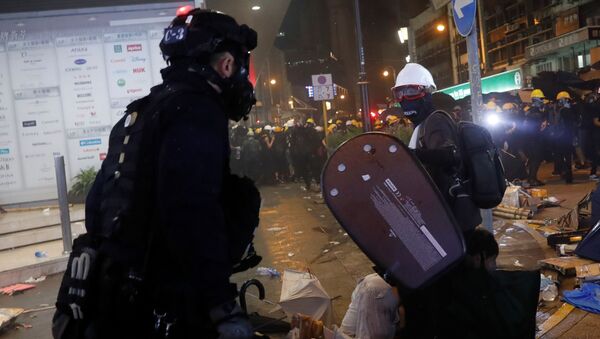Rupert Hogg, CEO of Cathay Pacific Airways, resigned suddenly on Friday after mainland China tightened oversight of the Hong Kong airline's safety protocols amid protests in the special administrative region (SAR).
Augustus Tang, the head of the Hong Kong Aircraft Engineering Company, has replaced Mr Hogg, with Ronald Lam replacing outgoing chief customer and commercial officer, Paul Loo, Reuters reported on Friday.
Company chairman John Slosar said that protests have called into question Cathay's commitment to flight safety and security, putting its reputation and brand at stake.
#CathayPacific announced the resignation of two executives on Fri, including CEO Rupert Hogg and Chief Customer and Commercial Officer Paul Loo. The reshuffle comes amid criticism of the airline due to its lukewarm attitude in drawing a line with its radical employees in HK.#香港 pic.twitter.com/n8sMXEqTnn
— Global Times (@globaltimesnews) August 16, 2019
“This is regrettable as we have always made safety and security our highest priority,” Mr Slosar said in a press statement. “We therefore think it is time to put a new management team in place who can reset confidence and lead the airline to new heights.”
Rallies across Hong Kong, which have lasted over 10 weeks, have disrupted flights and targeted travellers, have caused the SARs regional carrier to take further measures to ensure the safety of passengers at stocks plunged.
Operations in Hong Kong International Airport including check-in services have resumed normal. Please check your flight status at https://t.co/mkS9F2LDcW before proceeding to the airport. Once again, thank you for your understanding.
— Cathay Pacific (@cathaypacific) August 13, 2019
Mr Hogg, who was appointed CEO in May 2017, said in an email cited by Reuters that the incident was a "grave and critical time" for Cathay Pacific, adding that there was "no doubt" that the company's brand and reputation were under "immense pressure".
Cathay Pacific, which is owned 30 percent by state-owned enterprise (SOE) Air China, was hit by protests following a scrapped extradition law that would have seen criminal offenders extradited to the mainland.
Cathay's stocks also fell to 10-year lows on Tuesday, but bounced back the following day after the airline condemned the protests, Reuters said, adding that the company had vowed to follow Chinese aviation regulations and terminated employment for two pilots involved in the protests.
To date, Cathay was forced to cancel 272 flights, with 55,000 passengers being affected due to the disruptions.
“It is disappointing to learn of his resignation particularly given this current challenging period,” one analyst speaking on conditions of anonymity said as quoted by Reuters.
Protests have turned violent in Hong Kong over recent weeks after erupting in early June, with US president Donald Trump stating that he was "very concerned" and hoping that Chinese authorities would not launch a crackdown on demonstrators. The news follows trade talks between Washington and Beijing scheduled for next month, in addition to post-Brexit trade deals with Hong Kong's former colonial power, the United Kingdom, which were "moving along rapidly", the US president said. Despite Hong Kong CEO Carrie Lam stating that the bill was officially 'dead', protests continued throughout the region, with locals demanding universal suffrage and for Hong Kong authorities to drop criminal charges against protestors.
So literally moments ago this happened. Crowd leaving Hong Kong rally and the Star Spangled Banner began playing. pic.twitter.com/De5PuayhlP
— Brian Sullivan (@SullyCNBC) August 16, 2019
But Beijing has slammed the riots as 'Western interferance' multiple times, with the Office of the Commissioner of the Chinese Foreign Ministry in Hong Kong stating that US politicians were distorting facts and blindly pursuing "double standards", as well as colluding with "radical criminal elements" and "insanely" sponsoring anti-Crina criminal activities across SAR. Some protestors may be more concerned about becoming independent amid rising property prices and losing its position as the economic engine of Asia as mainland China surpasses the region, analysts have said.

